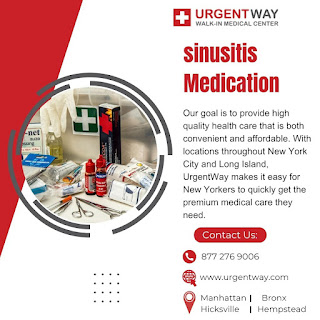When Should I See an ENT Specialist for Chronic SinusInfection Treatment?
When Should I See an ENT Specialist for Chronic SinusInfection Treatment?
If you're suffering from a stuffy nose, facial pressure, and never-ending nasal congestion, you're not alone. Many people struggle with sinus problems that go far beyond a common cold. When sinus symptoms don’t improve after weeks—or keep coming back—this may be a sign of a chronic sinus infection. But when is it time to stop using over-the-counter remedies and see an ENT specialist?
In this article, we’ll guide you through everything you need to know about chronic sinus infection treatment, including:
- What is a chronic sinus infection?
- Common symptoms and complications
- When to see an ENT specialist
- Types of treatment ENT doctors provide
- Preventing future sinus infections
What Is a Chronic Sinus Infection?
A chronic sinus infection, also known as chronic sinusitis, is a condition where the sinuses (air-filled spaces in the skull) remain inflamed and blocked for 12 weeks or longer, even with medical treatment.
This condition is different from acute sinusitis, which is short-term and usually clears up within 10–14 days. Chronic sinus infections often persist or come back multiple times a year.
Causes of Chronic Sinus Infections:
- Ongoing respiratory infections
- Nasal polyps (noncancerous growths)
- Deviated nasal septum
- Allergies and asthma
- Weak immune system
- Environmental irritants like smoke or pollution
Signs You May Need Chronic Sinus Infection Treatment
Most people try home remedies and over-the-counter decongestants for sinus relief. But if you’re experiencing any of the following long-lasting symptoms, it may be time to seek professional help:
Common Symptoms:
- Persistent nasal congestion or blockage
- Facial pain or pressure, especially around the eyes and forehead
- Thick, yellow or green nasal discharge
- Loss of sense of smell or taste
- Headaches or ear pain
- Postnasal drip (mucus dripping down the back of your throat)
- Fatigue and difficulty breathing
If these symptoms last more than 12 weeks or worsen despite treatment, they could signal a chronic sinus infection that needs expert care.
When Should You See an ENT Specialist?
An ENT specialist (Ear, Nose, and Throat doctor), also known as an otolaryngologist, is trained to diagnose and treat complex or long-standing sinus conditions.
Here are key signs that it’s time to schedule a visit:
1. Symptoms Last More Than 12 Weeks
If your symptoms don’t improve even after using antibiotics, nasal sprays, or home remedies, it’s a red flag. Chronic sinus infections require targeted treatment—often guided by a CT scan or endoscopy, which ENTs can perform.
2. Multiple Sinus Infections in a Year
If you’re getting 3 or more sinus infections per year, it may indicate a structural issue or underlying condition. ENT specialists can investigate and treat the root cause.
3. Recurrent Use of Antibiotics
If you’re repeatedly using antibiotics without long-term relief, an ENT can determine if there's a bacterial, fungal, or allergic component needing different care.
4. Nasal Polyps or Deviated Septum
ENTs can diagnose nasal polyps, a deviated septum, or other anatomical issues using imaging tools. These issues often require minor procedures or surgery.
5. Complications Such as Eye Pain or Swelling
If you’re experiencing vision changes, facial swelling, or high fever, your sinus infection may be spreading an emergency situation. ENT evaluation is crucial.
What Happens During an ENT Evaluation?
An ENT specialist begins with a detailed health history and physical exam. They may use tools like:
- Nasal endoscopy – a small camera to see inside the nasal passages
- CT scan – detailed imaging of sinus structures
- Allergy testing – to identify triggers
- Culture tests – to detect bacteria or fungi
These tests help the ENT doctor determine the most effective chronic sinus infection treatment tailored to your condition.
Chronic Sinus Infection Treatment Options
Once your ENT has diagnosed the cause of your chronic sinusitis, they’ll recommend a treatment plan that may include medical therapy or, in some cases, surgery.
1. Medical Treatments
a) Nasal Corticosteroids
These sprays reduce inflammation in the sinuses and help open up blocked nasal passages.
b) Saline Nasal Irrigation
Washing the nasal passages with sterile saline helps remove mucus, reduce bacteria, and improve breathing.
c) Oral or Injectable Steroids
Used for more severe inflammation, especially when nasal polyps are involved.
d) Antibiotics
Prescribed only if a bacterial infection is confirmed. Prolonged use is avoided unless absolutely necessary.
e) Antihistamines & Decongestants
If allergies are part of the problem, these can reduce symptoms and inflammation.
2. Surgical Treatments
If medications aren’t effective, your ENT may suggest minimally invasive sinus surgery options:
a) Balloon Sinuplasty
A tiny balloon is inserted and inflated to open blocked sinuses, often done in-office with minimal recovery time.
b) Functional Endoscopic Sinus Surgery (FESS)
Used to remove polyps or correct structural problems like a deviated septum.
c) Polyp Removal
Polyps that don’t respond to medication may need to be surgically removed to restore airflow.
Conclusion:
Chronic sinus infections can take a real toll on your daily life—causing discomfort, fatigue, and frustration. If your symptoms last more than 12 weeks or keep coming back, it’s time to consult an ENT specialist. With proper diagnosis and personalized chronic sinus infection treatment, you can finally breathe easier and enjoy a better quality of life.
Struggling with constant sinus pressure or nasal congestion
At UrgentWay Walk-In Medical Center, we provide expert chronic sinus infection treatment to help you breathe easier and feel better. Whether you need fast relief or a specialist referral, our experienced providers are here for you—no appointment needed!



Comments
Post a Comment